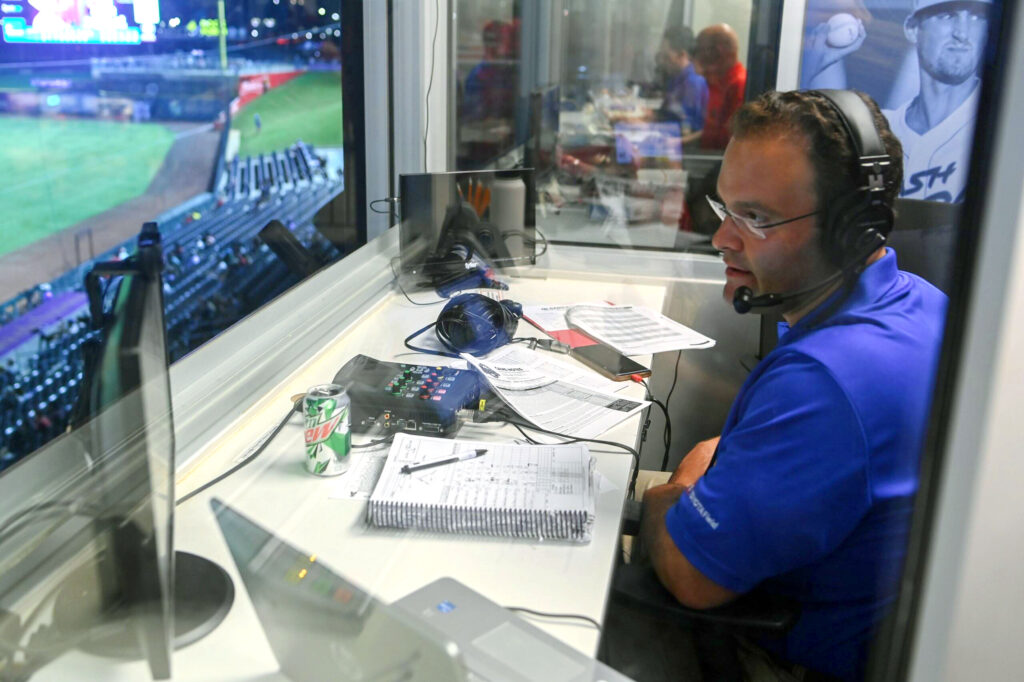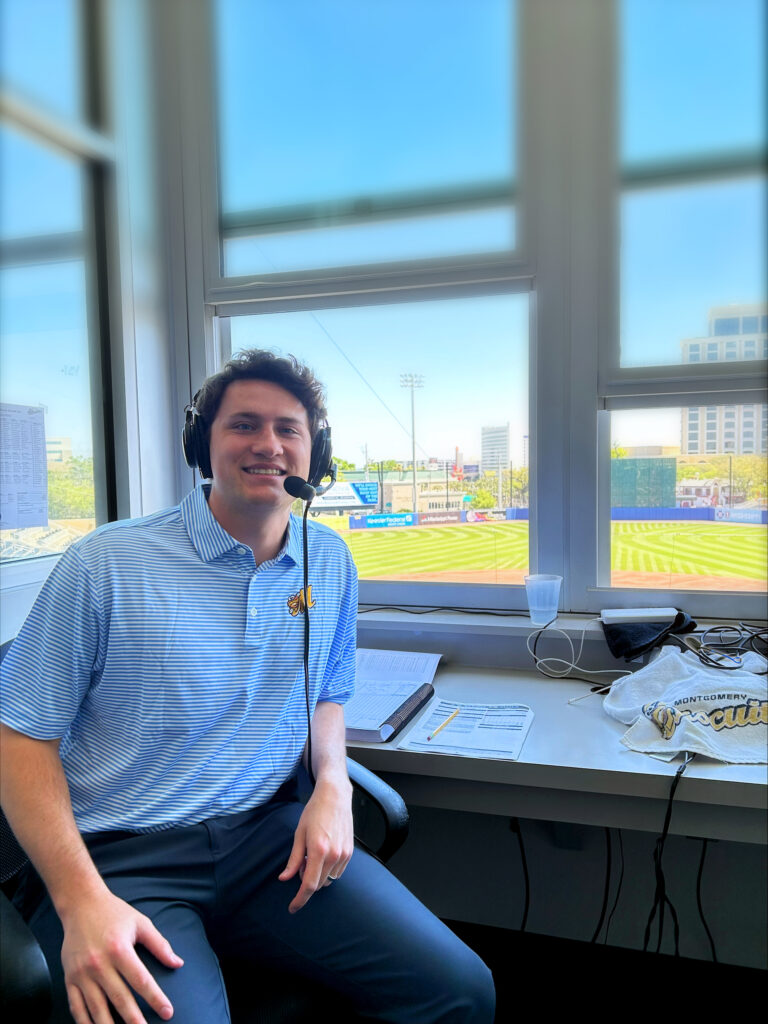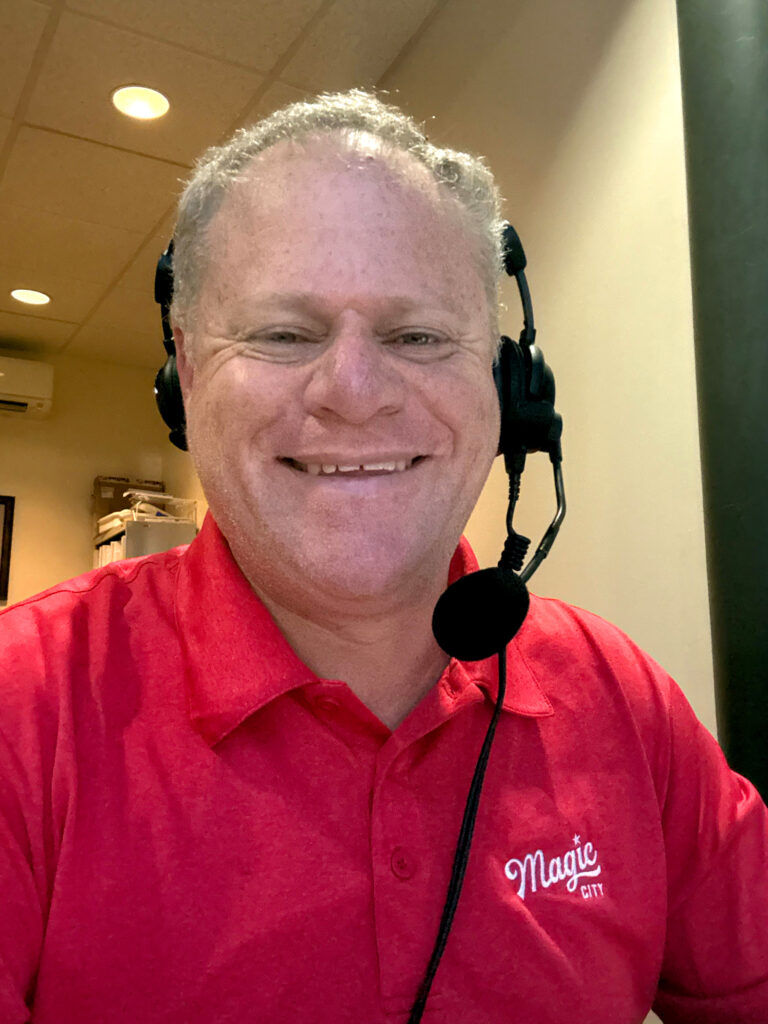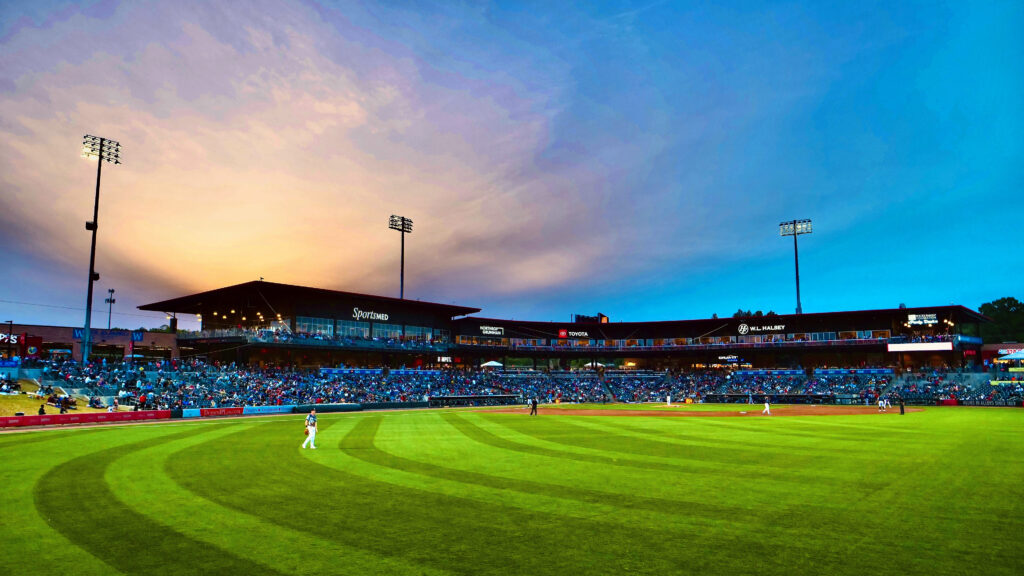By Scotty E. Kirkland
For a small state, Alabama is rich with minor league baseball teams. Six days a week, from April through September, you can likely find Minor League Baseball (MILB).
The Montgomery Biscuits, Birmingham Barons and Rocket City Trash Pandas play in some of the finest ballparks in the South. Their fans don’t have to travel to enjoy the sport. You can tune in, through a tried-and true medium: a radio broadcast of the games. The men responsible for these calls are part of a long, nostalgic chain of baseball broadcasters.
The men behind the mics
The three franchises are part of the eight team Southern League. It is divided into two, four-team divisions. Montgomery plays in the Southern Division, Birmingham and Rocket City in the Northern. Despite their proximity, the three Alabama teams face off sparingly this year, just two or three series each.
The youngest of Alabama’s broadcasters is Jack Sadighian, who is in his second season as the voice of the Montgomery Biscuits (a Tampa Bay Rays affiliate). A native of Chicago, he was raised in metro Atlanta. Last year, during the Biscuits offseason, the sportscaster lent his talents to calls for softball, football, basketball, lacrosse, volleyball and soccer.
With the opening of the Biscuits’ inaugural season in 2004, professional baseball returned to Alabama’s Capital City for the first time since 1980. The 7,000-seat Riverwalk Stadium helped spur a new period of downtown economic development. And with a long-term renewal on the stadium’s lease earlier this year, it seems the “Butter and Blue” will be in Montgomery for many years to come.
That’s just fine with Sadighian, whose first season with the team was one of their winningest in franchise history. “The vibes around baseball here are fantastic,” he says. “We have a great crowd in terms of watching the game and they’re so engaged.”
Up the road in Birmingham, there is a new voice in the historic booth. Although Doug Greenwald is new to Alabama, he has a long tenure in baseball. Greenwald took over the mic from Curt Bloom, who was the Barons announcer for 32 years. The Barons (a Chicago White Sox affiliate) are among the oldest teams in the MILB, with a history dating back to the 1880s and the days of segregated ball played by an all-African American semi-professional organization known as the Negro Leagues. Today, the Barons play ball at Regions Field, the largest ballpark of Alabama’s Double-A teams. With eight titles to their credit, the Barons lead the Southern League in championships, including the reigning title, secured last year in dramatic fashion against the Montgomery Biscuits.

Baseball broadcasting runs in the family. Doug’s late father, Hank Greenwald, was a longtime MLB broadcaster for the San Francisco Giants. As a kid, Doug would take his tape recorder to the ballpark and offer his own play-by-play.
“A lot of people think I sound like my dad,” Greenwald says. “He had a good sense of humor and a way of connecting with people on a personal level.”
Like Greenwald, the announcer for the Rocket City Trash Pandas (a Los Angeles Angels affiliate) has the job in his DNA. Josh Caray is a third-generation broadcaster. His grandfather was the legendary Harry Caray, who helped set the gold standard for sportscasters with decades behind the mic for the St. Louis Cardinals, Chicago White Sox and Chicago Cubs. Readers of this magazine are likely more familiar with Josh’s late father, Skip Caray, who lent his voice and singular wit to some of the most memorable seasons of the Atlanta Braves.
A longtime broadcaster in his own right, Caray has been with Rocket City since the beginning. The pandemic spoiled plans for their first season, but that did not slow the enthusiasm for the new franchise, owing in no small part to its quirky name and a space-bound raccoon mascot named Rocket. The franchise quickly racked up $2 million in merchandise sales.
“The community has been great. We have won the attendance battle in the Southern League the last four years,” Caray says. “We have certainly come a long way since 2020. I remember the stadium had opened, but the season had been cancelled, so we had to throw block parties, movie nights and put the Crimson Tide on the video board to get fans into the ballpark.”

Rising to the moment
Storylines tend to emerge by the time each six-game series begins on any given Tuesday night: A player facing off against a former team; a major-leaguer working his way back from injury; a greenhorn whose star is on the rise. In many ways, pregame preparation is little changed from the days of old,
Greenwald says.
“I remember my father would get up and prepare at six in the morning, seven in the morning. He would go through newspapers…which I think we still do. It’s just that we read them online now.” While broadcasters today have access to more information, and unprecedented access to players because of social media, Greenwald says that, once the game begins, much remains the same. “You’re still setting a defense properly. You’re still rising to the moment.”
There has been a concerted effort in recent years to speed the pace of play for professional baseball. The pitch clock is the most visible of these changes. Gone are the days of long at-bats, when a batter stalked around the box with ritualistic practice swings or a pitcher engaged in long pauses between throws. Now, just 20 seconds can pass between pitches.
That time between pitches and innings are the places where broadcasters shine, where they ply their trade of scene-setting, stat-spouting, storyline-building broadcast greatness. So you might be surprised to learn how Alabama’s announcers feel about the new rule. “The pitch clock is the best thing to happen to broadcasters,” says Caray. “Five-minute at-bats had become routine and really made our jobs a lot harder and exhausting…. It makes for a more engaging call because, as broadcasters, we have to stay on our toes.” Sadighian agrees: “I like the flow of the game. I think it makes it easier to call a game when there’s more of a flow
attached to it.”
“I’m old school,” Greenwald says. “I’ve always felt baseball was pure because there was no clock. You know, you have to earn your outs. It’s a thinking person’s game. But you know what? I’ve actually come to love it…. The pace is crisper.”

Rickwood Field
Alabama’s broadcasters routinely have the opportunity to participate in one of MILB’s great traditions. Since the mid-1990s, the Birmingham Barons have hosted a Southern League game at historic Rickwood Field. Opened in August 1910, it is the nation’s oldest professional baseball stadium, steeped in the history of the Negro Leagues and civil rights. The annual game pays homage to the league and its players.
At the 2024 Rickwood game, Jack Sadighian bore witness to one of the most poignant baseball moments in recent memory. The Biscuits and Barons squared off on the historic field on June 18, 2024, a few days ahead of the first-ever MLB game played there. Several innings into the game, news broke that Willie Mays, whose career had begun at Rickwood Field and who was among those scheduled to be honored at the upcoming MLB game, had died in California at the age of 93.
“I was throttled,” Sadighian recalled as he broke the news to listeners. “You could feel that somberness over the ballpark. There were people sobbing in the stands next to me.” The young broadcaster’s mic picked up a swelling chant from the crowd honoring one of their favorite sons: Willie! Willie!! Willie!!! Montgomery won the game 6-5.

“What am I going to see tonight?”
Alabama’s broadcasters have seen their share of memorable moments on the baseball diamond. For Sadighian, one such moment came in September 2024 when Biscuits outfielder Chandler Simpson became the first minor leaguer since 2012 to steal 100 bases in a season. “That was just really special,” he recalled, “and the ovation the crowd gave Chandler and how excited he was.” (Tampa Bay called Simpson up to the majors earlier this year.)
One of Caray’s most memorable moments is more ignominious: “In 2023, the Trash Pandas threw a no-hitter and lost 7-5 to Chattanooga. They were winning 3-0 heading into the last inning before four walks, four hit batters, an error and a wild pitch scored seven runs for the Lookouts. The game made SportsCenter and headlines in the New York Times.”
Over a three-decade career, Doug Greenwald has seen an awful lot from his perch in broadcast booths around the country. There was the game-stopping chase that ensued when a Fresno equipment manager’s pet English Bulldog charged onto the field, and a late-night extra-inning game interrupted by an automatic sprinkler system, to name just two. “That’s what I love about baseball. Once that first pitch is thrown, you have no idea what will happen.”
The story of Alabama’s MILB teams for the 2025 season is still being written. Birmingham is looking for a return to the championship, while Montgomery hopes to capitalize on an impressive homefield record and a strong start to the second half of the season. Further upstate, Rocket City is searching for a path back on track for a winning season. With league play scheduled through mid-September, a great deal of baseball remains.
Throughout all of it, listeners seeking distraction from the worries of the workaday world can tune in and, in the process, appreciate the undeniable craft of play-by-play announcing of the great American pastime. You might even hear a little minor-league magic over the air. As Barons announcer Doug Greenwald asks himself before the first pitch, “‘What am I going to see tonight?’”
NOTE: Find the broadcast stations for Alabama’s Double-A teams at www.MILB.com




